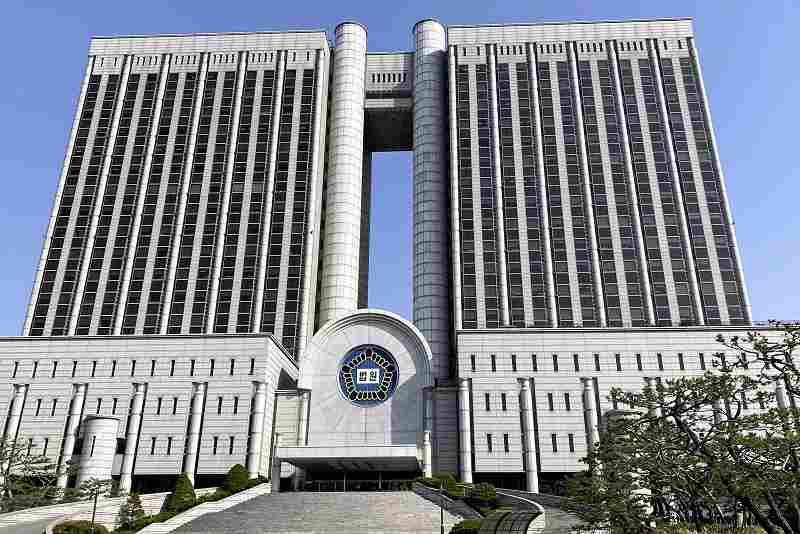South Korean court ruling on comfort women may reflect wishes of Moon administration

The Seoul Central District Court building in Seoul is seen Wednesday.
17:59 JST, April 22, 2021
SEOUL — In rejecting the claims of former so-called comfort women seeking compensation from the Japanese government, the latest ruling by the Seoul Central District Court was in direct opposition to the ruling made by the same court on a separate lawsuit in January, which ordered the Japanese government to pay compensation.
South Korean President Moon Jae-in’s criticism of the January ruling, a reversal of his previous position, is believed to have put a brake on the overreach of the judiciary.
Judgments divided
Former comfort women were seen leaving their seats in the courtroom without hearing the main text of the judgment, apparently because the judgment completely denied their claims.
The latest ruling has drawn particular attention with its reference to the 2015 bilateral agreement between Japan and South Korea, which made clear that the issue of comfort women had been “resolved finally and irreversibly.”
“It contained Japan’s feelings of apology and remorse [toward the victims]. With the funds provided by Japan, a foundation was also established. This measure was taken by the Japanese government to atone for the harm wrought on comfort women,” the latest ruling said.
It is unusual for the South Korean judiciary to praise Japan’s actions.
Regarding the fact that the Moon administration had effectively rejected the agreement, asserting that the accord “did not reflect the opinions of the former comfort women,” the latest ruling said, “It is difficult to affirm that the accord has clearly run counter to the opinions of former comfort women.”
The latest ruling, which differed from the Jan. 8 decision that ordered the Japanese government to pay compensation and assume the costs of the lawsuit, was supposedly influenced by the desires of the Moon administration.
During a New Year’s press conference on Jan. 18, Moon said he was “confused” by the ruling made earlier in the same month. In an apparent about-face, he made clear that he would recognize that the 2015 bilateral agreement was officially reached between the two governments.
In another unusual development, the latest ruling was put off shortly before the originally scheduled date of Jan. 13. An official in charge of public relations at the court said, “It became necessary to conduct additional deliberations.”
In trials related to Japan, the judicial authorities of South Korea have frequently handed down judgments that seemed conscious of public opinion against Japan, “moving the goalposts,” as a Japanese government official put it. At the same time, the judiciary has sometimes taken into account the administration’s desires, which is believed to have led to inconsistencies in its judgments.
South Korea’s Supreme Court ruled for the first time in 2012 that former wartime requisitioned workers who were mobilized from the Korean Peninsula still had the right to seek compensation as individuals. It thereby reversed the original ruling in the case, in which the plaintiffs had lost.
However, the Seoul Central District Court in 2015 acquitted a former Seoul bureau chief of The Sankei Shimbun, who was charged with defaming the character of then South Korean President Park Geun-hye. The court had received a document written by South Korea’s Foreign Ministry calling on it to take appropriate steps.
Problem far from solved
South Korea’s Foreign Ministry on Wednesday urged the Japanese government to “demonstrate moves in accord with the spirit of remorse that it has made clear.” Regarding the ruling, however, it did not go any further than saying, “We will refrain from making any specific reference.”
The center-left South Korean newspaper The Hankyoreh wrote in its online edition that the latest ruling has forced an end to the battle of former comfort women over the past 30 years.
The district court denied a request to seize Japanese government assets in South Korea to pay the costs of the lawsuit. A scenario may have been averted in which the Japanese government would suffer “effective damage” in later lawsuits over comfort women.
However, litigation brought by former wartime requisitioned workers from the Korean Peninsula remains a problem. The Moon administration sought a solution by suggesting to the plaintiffs that the South Korean government would compensate them in place of Japanese companies, but this was met with strong opposition from some.
Moon is slated to hold in-person talks with U.S. President Joe Biden in the latter half of May. As Biden is pressing for an early improvement in the bilateral relations between Japan and South Korea, Moon’s response has drawn much attention.
Top Articles in Editorial & Columns
-

Riku-Ryu Pair Wins Gold Medal: Their Strong Bond Leads to Major Comeback Victory
-

Reciprocal Tariffs Ruled Illegal: Judiciary Would Not Tolerate President’s High-Handed Approach
-

China Provoked Takaichi into Risky Move of Dissolving House of Representatives, But It’s a Gamble She Just Might Win
-

Japan’s Plan for Investment in U.S.: Aim for Mutual Development by Ensuring Profitability
-

Flu Cases Surging Again: Infection Can Also Be Prevented by Humidifying Indoor Spaces
JN ACCESS RANKING
-

Producer Behind Pop Group XG Arrested for Cocaine Possession
-

Japan PM Takaichi’s Cabinet Resigns en Masse
-

Man Infected with Measles Reportedly Dined at Restaurant in Tokyo Station
-

Israeli Ambassador to Japan Speaks about Japan’s Role in the Reconstruction of Gaza
-

Videos Plagiarized, Reposted with False Subtitles Claiming ‘Ryukyu Belongs to China’; Anti-China False Information Also Posted in Japan






















